Study Skills for Higher Education: Gardener's Theory - CCCU
VerifiedAdded on 2023/06/11
|9
|2599
|340
Essay
AI Summary
This essay explores study skills for higher education, focusing on Howard Gardener's Theory of Multiple Intelligences and effective teaching methods. It discusses the eight intelligences proposed by Gardener: linguistic, logical-mathematical, spatial, bodily-kinesthetic, musical, interpersonal, intrapersonal, and naturalistic, detailing how each intelligence manifests and how teachers can leverage these intelligences to personalize lessons and assignments. The essay further suggests practical teaching strategies for each intelligence type, such as essay writing and debates for linguistic learners, puzzles and coding for mathematical learners, and mind mapping for visual learners. It emphasizes the importance of recognizing and catering to diverse learning styles to enhance student engagement and academic success. The document is available on Desklib, a platform offering a variety of study resources for students.
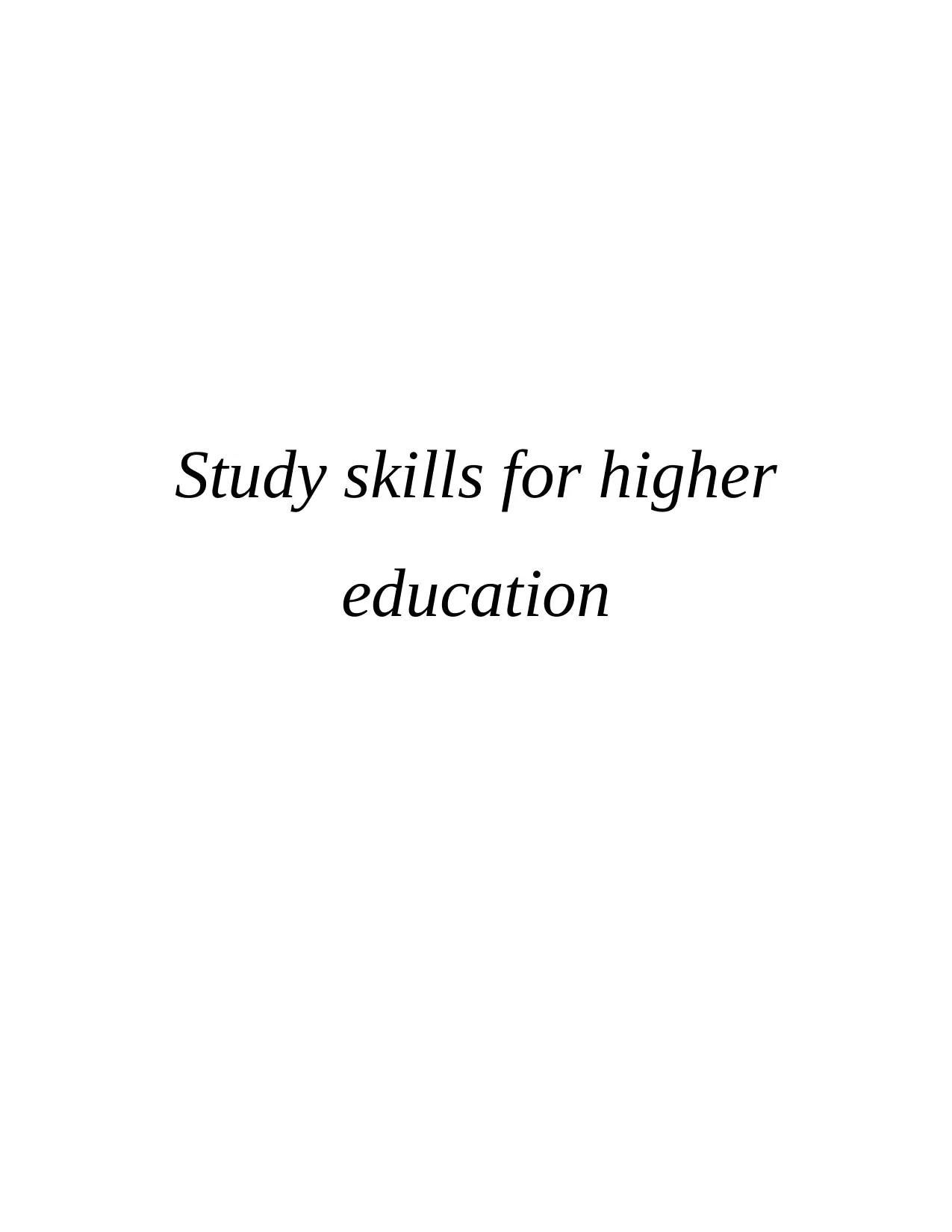
Study skills for higher
education
education
Paraphrase This Document
Need a fresh take? Get an instant paraphrase of this document with our AI Paraphraser
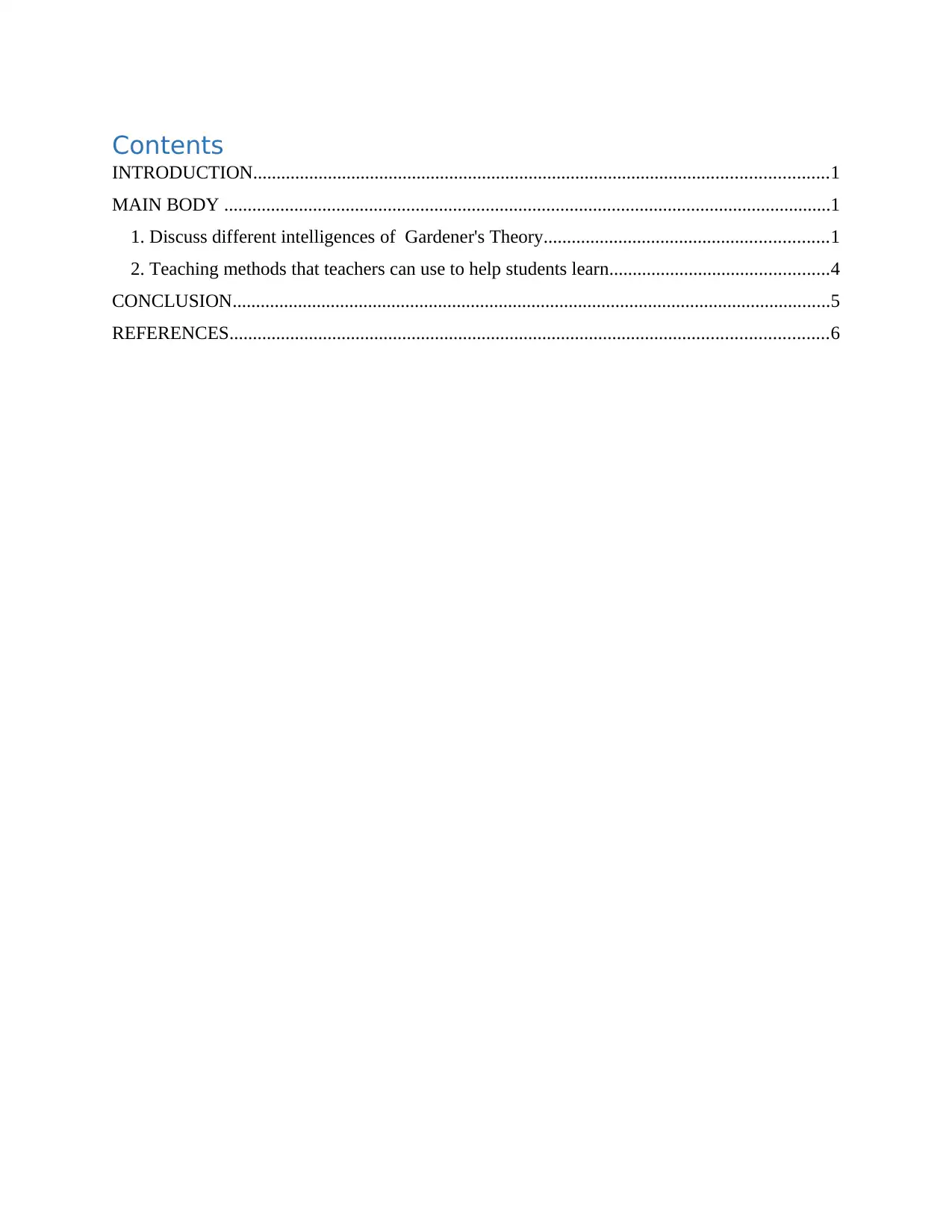
Contents
INTRODUCTION...........................................................................................................................1
MAIN BODY ..................................................................................................................................1
1. Discuss different intelligences of Gardener's Theory.............................................................1
2. Teaching methods that teachers can use to help students learn...............................................4
CONCLUSION................................................................................................................................5
REFERENCES................................................................................................................................6
INTRODUCTION...........................................................................................................................1
MAIN BODY ..................................................................................................................................1
1. Discuss different intelligences of Gardener's Theory.............................................................1
2. Teaching methods that teachers can use to help students learn...............................................4
CONCLUSION................................................................................................................................5
REFERENCES................................................................................................................................6
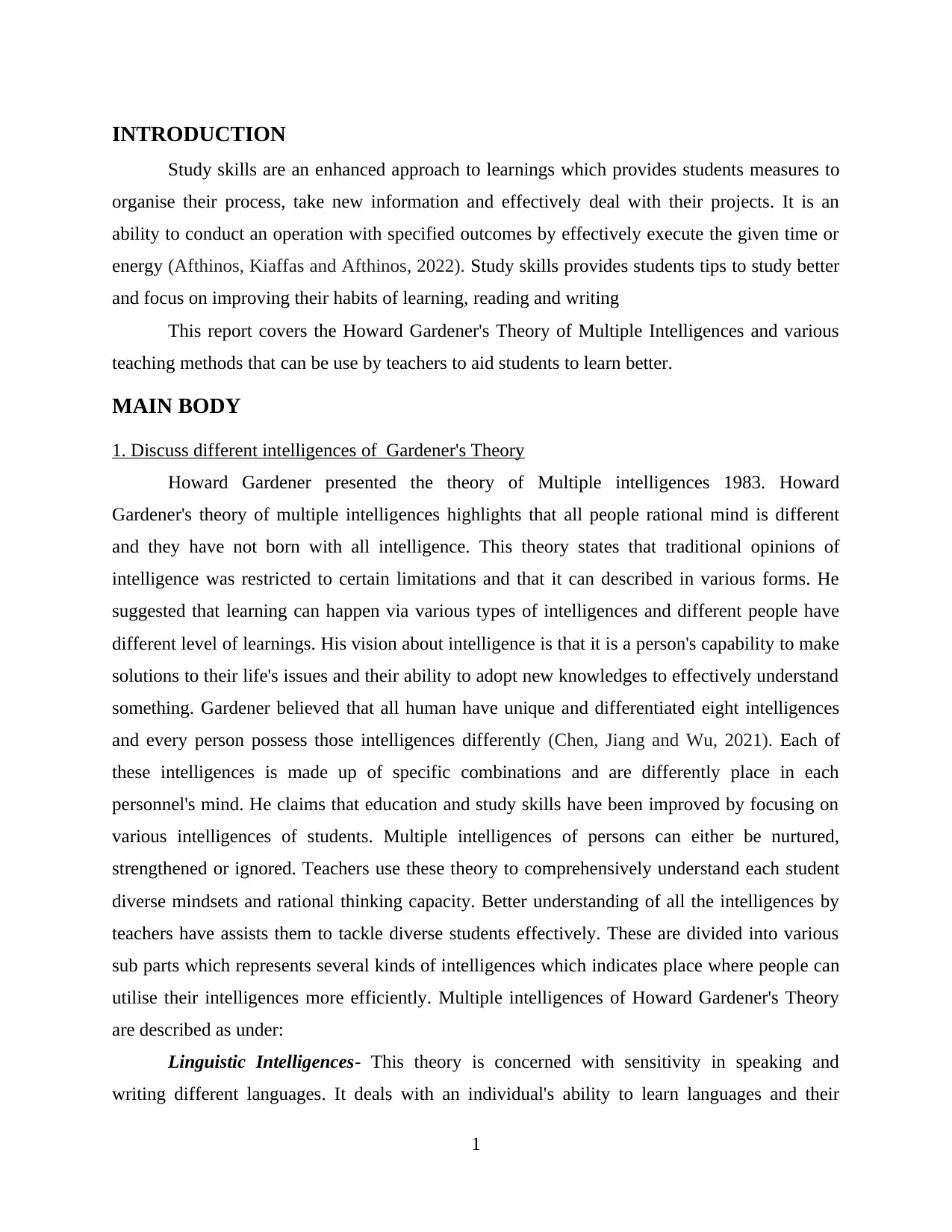
INTRODUCTION
Study skills are an enhanced approach to learnings which provides students measures to
organise their process, take new information and effectively deal with their projects. It is an
ability to conduct an operation with specified outcomes by effectively execute the given time or
energy (Afthinos, Kiaffas and Afthinos, 2022). Study skills provides students tips to study better
and focus on improving their habits of learning, reading and writing
This report covers the Howard Gardener's Theory of Multiple Intelligences and various
teaching methods that can be use by teachers to aid students to learn better.
MAIN BODY
1. Discuss different intelligences of Gardener's Theory
Howard Gardener presented the theory of Multiple intelligences 1983. Howard
Gardener's theory of multiple intelligences highlights that all people rational mind is different
and they have not born with all intelligence. This theory states that traditional opinions of
intelligence was restricted to certain limitations and that it can described in various forms. He
suggested that learning can happen via various types of intelligences and different people have
different level of learnings. His vision about intelligence is that it is a person's capability to make
solutions to their life's issues and their ability to adopt new knowledges to effectively understand
something. Gardener believed that all human have unique and differentiated eight intelligences
and every person possess those intelligences differently (Chen, Jiang and Wu, 2021). Each of
these intelligences is made up of specific combinations and are differently place in each
personnel's mind. He claims that education and study skills have been improved by focusing on
various intelligences of students. Multiple intelligences of persons can either be nurtured,
strengthened or ignored. Teachers use these theory to comprehensively understand each student
diverse mindsets and rational thinking capacity. Better understanding of all the intelligences by
teachers have assists them to tackle diverse students effectively. These are divided into various
sub parts which represents several kinds of intelligences which indicates place where people can
utilise their intelligences more efficiently. Multiple intelligences of Howard Gardener's Theory
are described as under:
Linguistic Intelligences- This theory is concerned with sensitivity in speaking and
writing different languages. It deals with an individual's ability to learn languages and their
1
Study skills are an enhanced approach to learnings which provides students measures to
organise their process, take new information and effectively deal with their projects. It is an
ability to conduct an operation with specified outcomes by effectively execute the given time or
energy (Afthinos, Kiaffas and Afthinos, 2022). Study skills provides students tips to study better
and focus on improving their habits of learning, reading and writing
This report covers the Howard Gardener's Theory of Multiple Intelligences and various
teaching methods that can be use by teachers to aid students to learn better.
MAIN BODY
1. Discuss different intelligences of Gardener's Theory
Howard Gardener presented the theory of Multiple intelligences 1983. Howard
Gardener's theory of multiple intelligences highlights that all people rational mind is different
and they have not born with all intelligence. This theory states that traditional opinions of
intelligence was restricted to certain limitations and that it can described in various forms. He
suggested that learning can happen via various types of intelligences and different people have
different level of learnings. His vision about intelligence is that it is a person's capability to make
solutions to their life's issues and their ability to adopt new knowledges to effectively understand
something. Gardener believed that all human have unique and differentiated eight intelligences
and every person possess those intelligences differently (Chen, Jiang and Wu, 2021). Each of
these intelligences is made up of specific combinations and are differently place in each
personnel's mind. He claims that education and study skills have been improved by focusing on
various intelligences of students. Multiple intelligences of persons can either be nurtured,
strengthened or ignored. Teachers use these theory to comprehensively understand each student
diverse mindsets and rational thinking capacity. Better understanding of all the intelligences by
teachers have assists them to tackle diverse students effectively. These are divided into various
sub parts which represents several kinds of intelligences which indicates place where people can
utilise their intelligences more efficiently. Multiple intelligences of Howard Gardener's Theory
are described as under:
Linguistic Intelligences- This theory is concerned with sensitivity in speaking and
writing different languages. It deals with an individual's ability to learn languages and their
1
⊘ This is a preview!⊘
Do you want full access?
Subscribe today to unlock all pages.

Trusted by 1+ million students worldwide
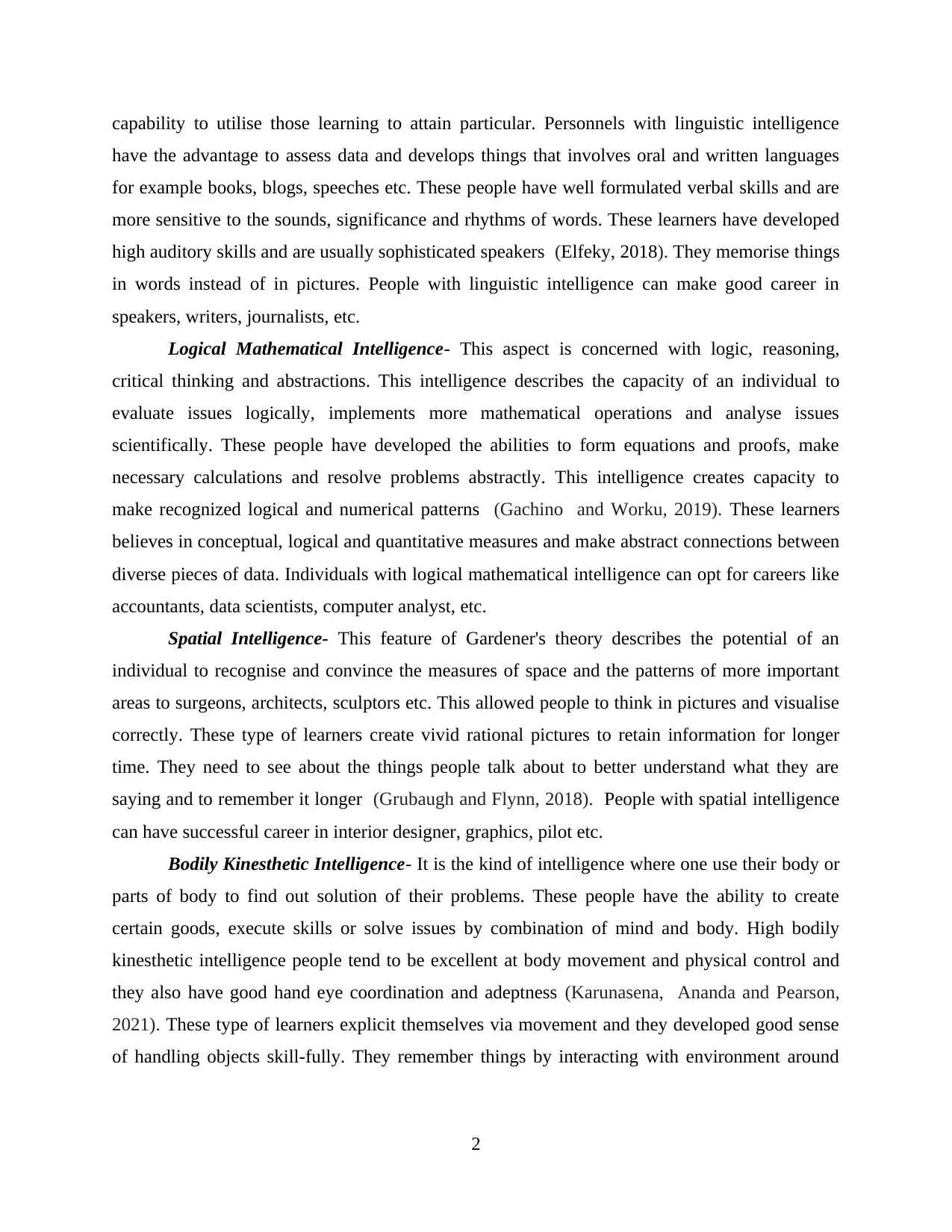
capability to utilise those learning to attain particular. Personnels with linguistic intelligence
have the advantage to assess data and develops things that involves oral and written languages
for example books, blogs, speeches etc. These people have well formulated verbal skills and are
more sensitive to the sounds, significance and rhythms of words. These learners have developed
high auditory skills and are usually sophisticated speakers (Elfeky, 2018). They memorise things
in words instead of in pictures. People with linguistic intelligence can make good career in
speakers, writers, journalists, etc.
Logical Mathematical Intelligence- This aspect is concerned with logic, reasoning,
critical thinking and abstractions. This intelligence describes the capacity of an individual to
evaluate issues logically, implements more mathematical operations and analyse issues
scientifically. These people have developed the abilities to form equations and proofs, make
necessary calculations and resolve problems abstractly. This intelligence creates capacity to
make recognized logical and numerical patterns (Gachino and Worku, 2019). These learners
believes in conceptual, logical and quantitative measures and make abstract connections between
diverse pieces of data. Individuals with logical mathematical intelligence can opt for careers like
accountants, data scientists, computer analyst, etc.
Spatial Intelligence- This feature of Gardener's theory describes the potential of an
individual to recognise and convince the measures of space and the patterns of more important
areas to surgeons, architects, sculptors etc. This allowed people to think in pictures and visualise
correctly. These type of learners create vivid rational pictures to retain information for longer
time. They need to see about the things people talk about to better understand what they are
saying and to remember it longer (Grubaugh and Flynn, 2018). People with spatial intelligence
can have successful career in interior designer, graphics, pilot etc.
Bodily Kinesthetic Intelligence- It is the kind of intelligence where one use their body or
parts of body to find out solution of their problems. These people have the ability to create
certain goods, execute skills or solve issues by combination of mind and body. High bodily
kinesthetic intelligence people tend to be excellent at body movement and physical control and
they also have good hand eye coordination and adeptness (Karunasena, Ananda and Pearson,
2021). These type of learners explicit themselves via movement and they developed good sense
of handling objects skill-fully. They remember things by interacting with environment around
2
have the advantage to assess data and develops things that involves oral and written languages
for example books, blogs, speeches etc. These people have well formulated verbal skills and are
more sensitive to the sounds, significance and rhythms of words. These learners have developed
high auditory skills and are usually sophisticated speakers (Elfeky, 2018). They memorise things
in words instead of in pictures. People with linguistic intelligence can make good career in
speakers, writers, journalists, etc.
Logical Mathematical Intelligence- This aspect is concerned with logic, reasoning,
critical thinking and abstractions. This intelligence describes the capacity of an individual to
evaluate issues logically, implements more mathematical operations and analyse issues
scientifically. These people have developed the abilities to form equations and proofs, make
necessary calculations and resolve problems abstractly. This intelligence creates capacity to
make recognized logical and numerical patterns (Gachino and Worku, 2019). These learners
believes in conceptual, logical and quantitative measures and make abstract connections between
diverse pieces of data. Individuals with logical mathematical intelligence can opt for careers like
accountants, data scientists, computer analyst, etc.
Spatial Intelligence- This feature of Gardener's theory describes the potential of an
individual to recognise and convince the measures of space and the patterns of more important
areas to surgeons, architects, sculptors etc. This allowed people to think in pictures and visualise
correctly. These type of learners create vivid rational pictures to retain information for longer
time. They need to see about the things people talk about to better understand what they are
saying and to remember it longer (Grubaugh and Flynn, 2018). People with spatial intelligence
can have successful career in interior designer, graphics, pilot etc.
Bodily Kinesthetic Intelligence- It is the kind of intelligence where one use their body or
parts of body to find out solution of their problems. These people have the ability to create
certain goods, execute skills or solve issues by combination of mind and body. High bodily
kinesthetic intelligence people tend to be excellent at body movement and physical control and
they also have good hand eye coordination and adeptness (Karunasena, Ananda and Pearson,
2021). These type of learners explicit themselves via movement and they developed good sense
of handling objects skill-fully. They remember things by interacting with environment around
2
Paraphrase This Document
Need a fresh take? Get an instant paraphrase of this document with our AI Paraphraser
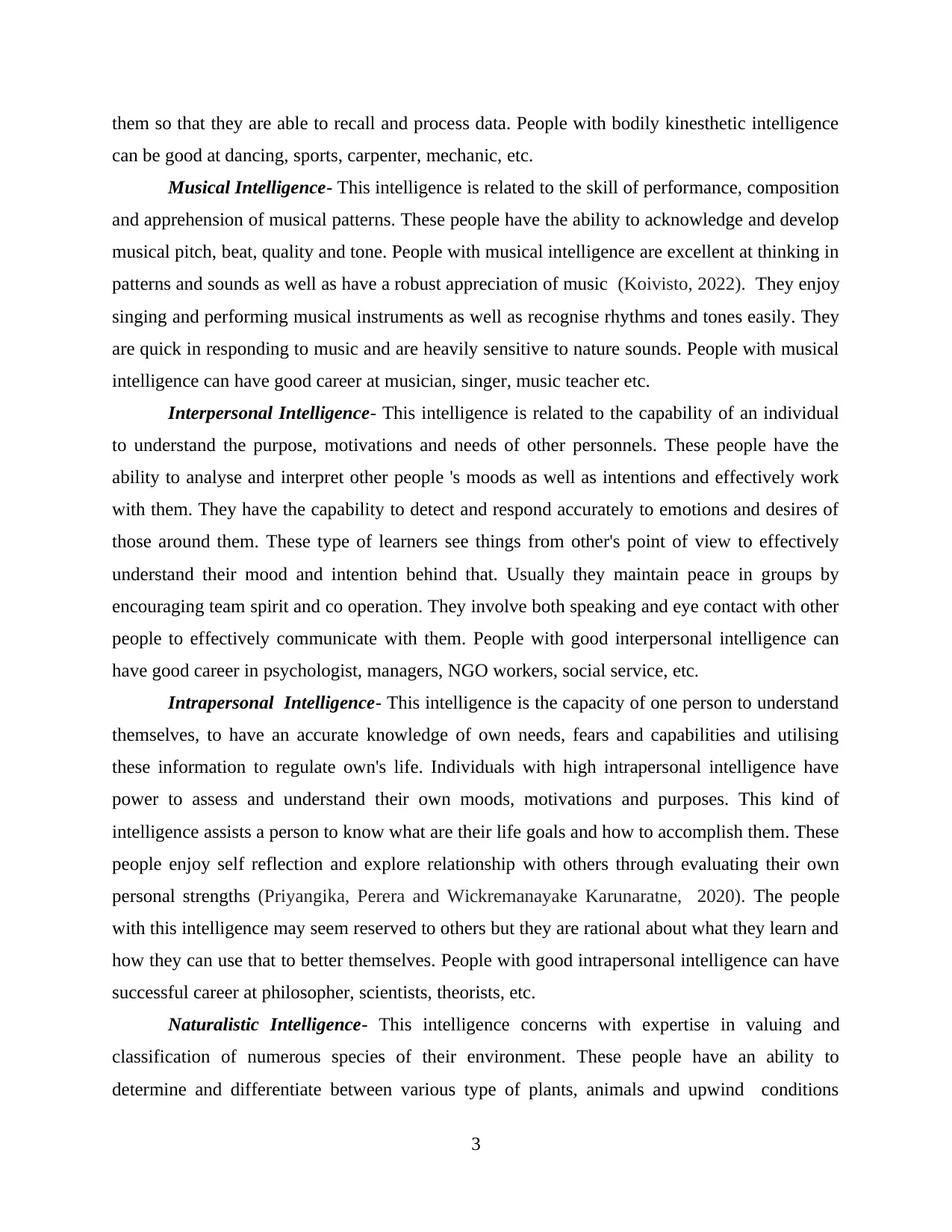
them so that they are able to recall and process data. People with bodily kinesthetic intelligence
can be good at dancing, sports, carpenter, mechanic, etc.
Musical Intelligence- This intelligence is related to the skill of performance, composition
and apprehension of musical patterns. These people have the ability to acknowledge and develop
musical pitch, beat, quality and tone. People with musical intelligence are excellent at thinking in
patterns and sounds as well as have a robust appreciation of music (Koivisto, 2022). They enjoy
singing and performing musical instruments as well as recognise rhythms and tones easily. They
are quick in responding to music and are heavily sensitive to nature sounds. People with musical
intelligence can have good career at musician, singer, music teacher etc.
Interpersonal Intelligence- This intelligence is related to the capability of an individual
to understand the purpose, motivations and needs of other personnels. These people have the
ability to analyse and interpret other people 's moods as well as intentions and effectively work
with them. They have the capability to detect and respond accurately to emotions and desires of
those around them. These type of learners see things from other's point of view to effectively
understand their mood and intention behind that. Usually they maintain peace in groups by
encouraging team spirit and co operation. They involve both speaking and eye contact with other
people to effectively communicate with them. People with good interpersonal intelligence can
have good career in psychologist, managers, NGO workers, social service, etc.
Intrapersonal Intelligence- This intelligence is the capacity of one person to understand
themselves, to have an accurate knowledge of own needs, fears and capabilities and utilising
these information to regulate own's life. Individuals with high intrapersonal intelligence have
power to assess and understand their own moods, motivations and purposes. This kind of
intelligence assists a person to know what are their life goals and how to accomplish them. These
people enjoy self reflection and explore relationship with others through evaluating their own
personal strengths (Priyangika, Perera and Wickremanayake Karunaratne, 2020). The people
with this intelligence may seem reserved to others but they are rational about what they learn and
how they can use that to better themselves. People with good intrapersonal intelligence can have
successful career at philosopher, scientists, theorists, etc.
Naturalistic Intelligence- This intelligence concerns with expertise in valuing and
classification of numerous species of their environment. These people have an ability to
determine and differentiate between various type of plants, animals and upwind conditions
3
can be good at dancing, sports, carpenter, mechanic, etc.
Musical Intelligence- This intelligence is related to the skill of performance, composition
and apprehension of musical patterns. These people have the ability to acknowledge and develop
musical pitch, beat, quality and tone. People with musical intelligence are excellent at thinking in
patterns and sounds as well as have a robust appreciation of music (Koivisto, 2022). They enjoy
singing and performing musical instruments as well as recognise rhythms and tones easily. They
are quick in responding to music and are heavily sensitive to nature sounds. People with musical
intelligence can have good career at musician, singer, music teacher etc.
Interpersonal Intelligence- This intelligence is related to the capability of an individual
to understand the purpose, motivations and needs of other personnels. These people have the
ability to analyse and interpret other people 's moods as well as intentions and effectively work
with them. They have the capability to detect and respond accurately to emotions and desires of
those around them. These type of learners see things from other's point of view to effectively
understand their mood and intention behind that. Usually they maintain peace in groups by
encouraging team spirit and co operation. They involve both speaking and eye contact with other
people to effectively communicate with them. People with good interpersonal intelligence can
have good career in psychologist, managers, NGO workers, social service, etc.
Intrapersonal Intelligence- This intelligence is the capacity of one person to understand
themselves, to have an accurate knowledge of own needs, fears and capabilities and utilising
these information to regulate own's life. Individuals with high intrapersonal intelligence have
power to assess and understand their own moods, motivations and purposes. This kind of
intelligence assists a person to know what are their life goals and how to accomplish them. These
people enjoy self reflection and explore relationship with others through evaluating their own
personal strengths (Priyangika, Perera and Wickremanayake Karunaratne, 2020). The people
with this intelligence may seem reserved to others but they are rational about what they learn and
how they can use that to better themselves. People with good intrapersonal intelligence can have
successful career at philosopher, scientists, theorists, etc.
Naturalistic Intelligence- This intelligence concerns with expertise in valuing and
classification of numerous species of their environment. These people have an ability to
determine and differentiate between various type of plants, animals and upwind conditions
3
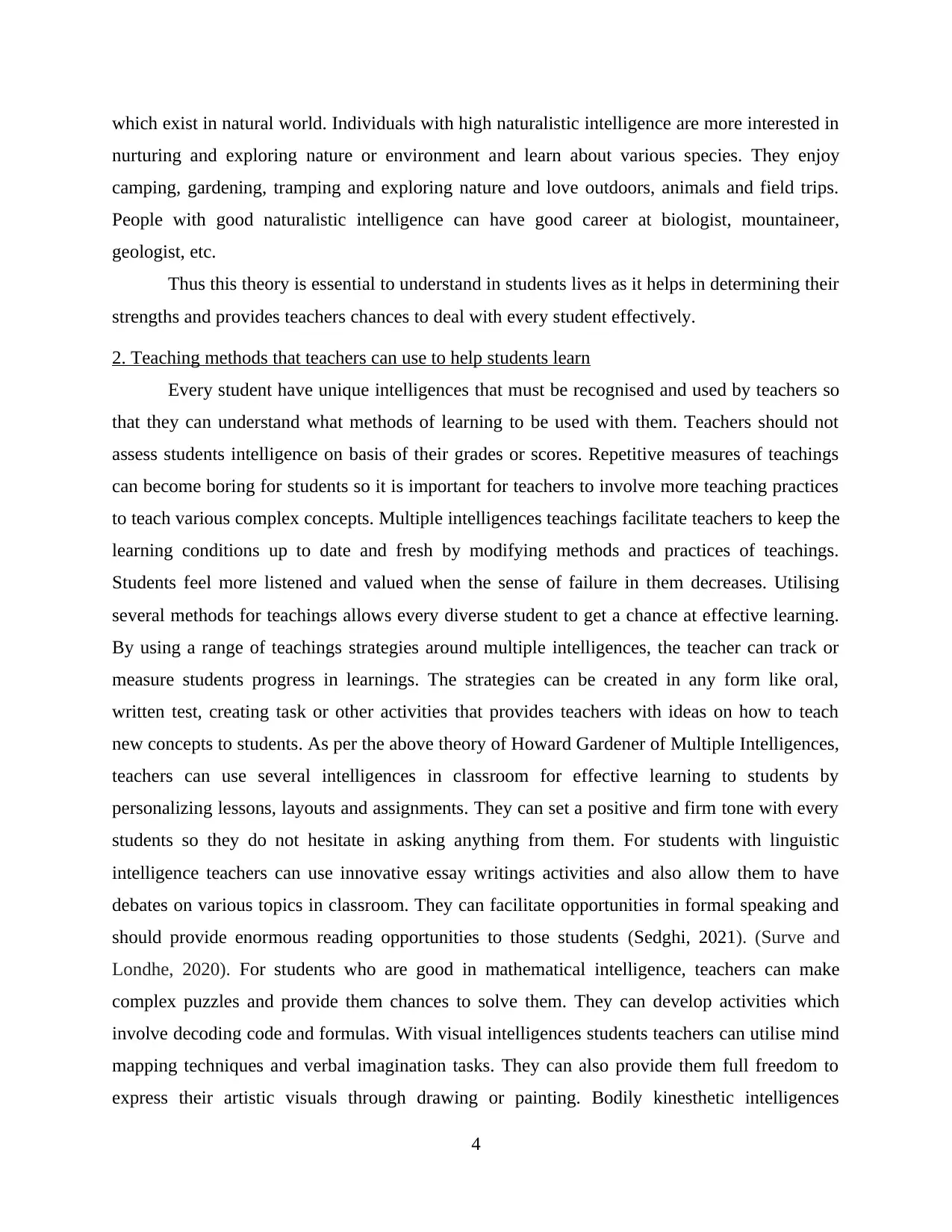
which exist in natural world. Individuals with high naturalistic intelligence are more interested in
nurturing and exploring nature or environment and learn about various species. They enjoy
camping, gardening, tramping and exploring nature and love outdoors, animals and field trips.
People with good naturalistic intelligence can have good career at biologist, mountaineer,
geologist, etc.
Thus this theory is essential to understand in students lives as it helps in determining their
strengths and provides teachers chances to deal with every student effectively.
2. Teaching methods that teachers can use to help students learn
Every student have unique intelligences that must be recognised and used by teachers so
that they can understand what methods of learning to be used with them. Teachers should not
assess students intelligence on basis of their grades or scores. Repetitive measures of teachings
can become boring for students so it is important for teachers to involve more teaching practices
to teach various complex concepts. Multiple intelligences teachings facilitate teachers to keep the
learning conditions up to date and fresh by modifying methods and practices of teachings.
Students feel more listened and valued when the sense of failure in them decreases. Utilising
several methods for teachings allows every diverse student to get a chance at effective learning.
By using a range of teachings strategies around multiple intelligences, the teacher can track or
measure students progress in learnings. The strategies can be created in any form like oral,
written test, creating task or other activities that provides teachers with ideas on how to teach
new concepts to students. As per the above theory of Howard Gardener of Multiple Intelligences,
teachers can use several intelligences in classroom for effective learning to students by
personalizing lessons, layouts and assignments. They can set a positive and firm tone with every
students so they do not hesitate in asking anything from them. For students with linguistic
intelligence teachers can use innovative essay writings activities and also allow them to have
debates on various topics in classroom. They can facilitate opportunities in formal speaking and
should provide enormous reading opportunities to those students (Sedghi, 2021). (Surve and
Londhe, 2020). For students who are good in mathematical intelligence, teachers can make
complex puzzles and provide them chances to solve them. They can develop activities which
involve decoding code and formulas. With visual intelligences students teachers can utilise mind
mapping techniques and verbal imagination tasks. They can also provide them full freedom to
express their artistic visuals through drawing or painting. Bodily kinesthetic intelligences
4
nurturing and exploring nature or environment and learn about various species. They enjoy
camping, gardening, tramping and exploring nature and love outdoors, animals and field trips.
People with good naturalistic intelligence can have good career at biologist, mountaineer,
geologist, etc.
Thus this theory is essential to understand in students lives as it helps in determining their
strengths and provides teachers chances to deal with every student effectively.
2. Teaching methods that teachers can use to help students learn
Every student have unique intelligences that must be recognised and used by teachers so
that they can understand what methods of learning to be used with them. Teachers should not
assess students intelligence on basis of their grades or scores. Repetitive measures of teachings
can become boring for students so it is important for teachers to involve more teaching practices
to teach various complex concepts. Multiple intelligences teachings facilitate teachers to keep the
learning conditions up to date and fresh by modifying methods and practices of teachings.
Students feel more listened and valued when the sense of failure in them decreases. Utilising
several methods for teachings allows every diverse student to get a chance at effective learning.
By using a range of teachings strategies around multiple intelligences, the teacher can track or
measure students progress in learnings. The strategies can be created in any form like oral,
written test, creating task or other activities that provides teachers with ideas on how to teach
new concepts to students. As per the above theory of Howard Gardener of Multiple Intelligences,
teachers can use several intelligences in classroom for effective learning to students by
personalizing lessons, layouts and assignments. They can set a positive and firm tone with every
students so they do not hesitate in asking anything from them. For students with linguistic
intelligence teachers can use innovative essay writings activities and also allow them to have
debates on various topics in classroom. They can facilitate opportunities in formal speaking and
should provide enormous reading opportunities to those students (Sedghi, 2021). (Surve and
Londhe, 2020). For students who are good in mathematical intelligence, teachers can make
complex puzzles and provide them chances to solve them. They can develop activities which
involve decoding code and formulas. With visual intelligences students teachers can utilise mind
mapping techniques and verbal imagination tasks. They can also provide them full freedom to
express their artistic visuals through drawing or painting. Bodily kinesthetic intelligences
4
⊘ This is a preview!⊘
Do you want full access?
Subscribe today to unlock all pages.

Trusted by 1+ million students worldwide
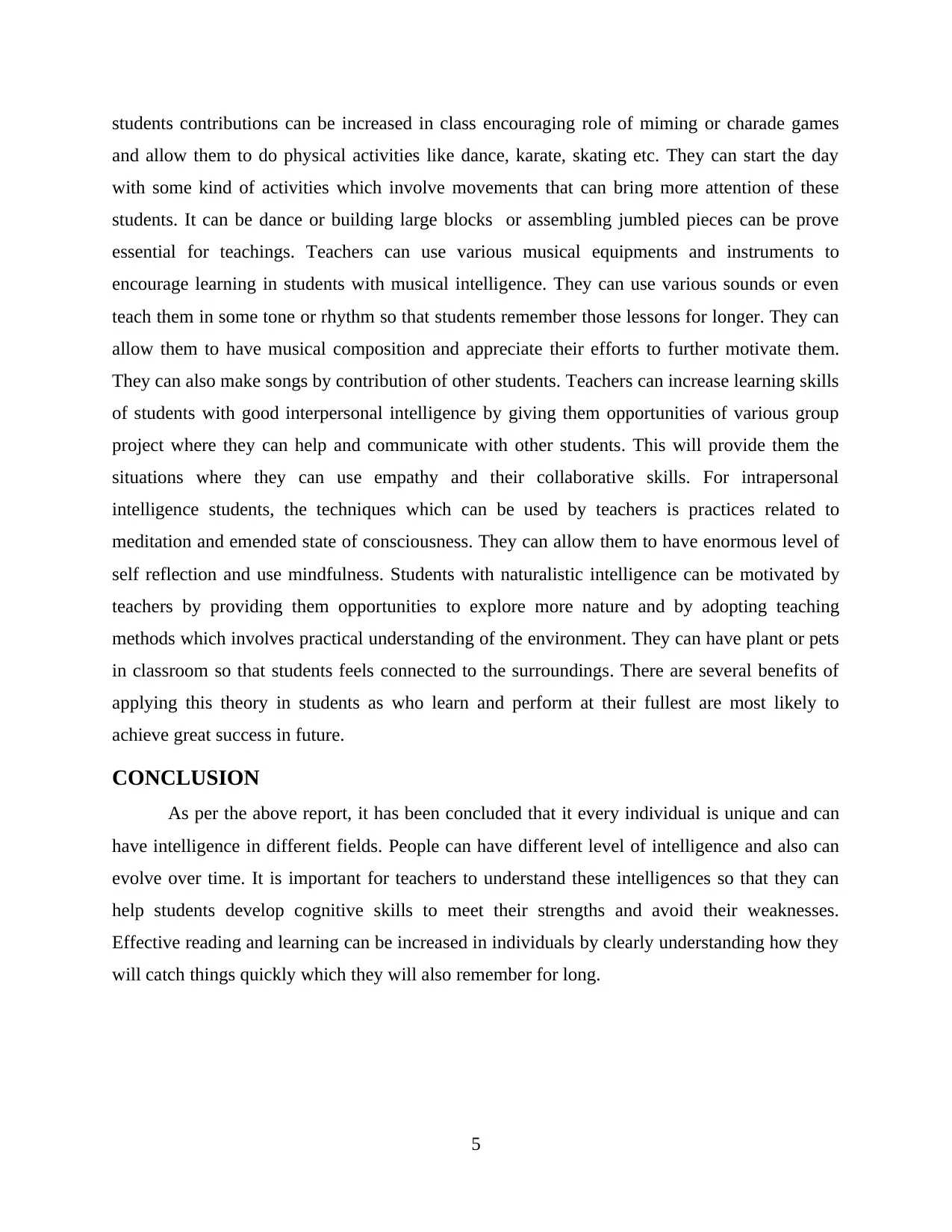
students contributions can be increased in class encouraging role of miming or charade games
and allow them to do physical activities like dance, karate, skating etc. They can start the day
with some kind of activities which involve movements that can bring more attention of these
students. It can be dance or building large blocks or assembling jumbled pieces can be prove
essential for teachings. Teachers can use various musical equipments and instruments to
encourage learning in students with musical intelligence. They can use various sounds or even
teach them in some tone or rhythm so that students remember those lessons for longer. They can
allow them to have musical composition and appreciate their efforts to further motivate them.
They can also make songs by contribution of other students. Teachers can increase learning skills
of students with good interpersonal intelligence by giving them opportunities of various group
project where they can help and communicate with other students. This will provide them the
situations where they can use empathy and their collaborative skills. For intrapersonal
intelligence students, the techniques which can be used by teachers is practices related to
meditation and emended state of consciousness. They can allow them to have enormous level of
self reflection and use mindfulness. Students with naturalistic intelligence can be motivated by
teachers by providing them opportunities to explore more nature and by adopting teaching
methods which involves practical understanding of the environment. They can have plant or pets
in classroom so that students feels connected to the surroundings. There are several benefits of
applying this theory in students as who learn and perform at their fullest are most likely to
achieve great success in future.
CONCLUSION
As per the above report, it has been concluded that it every individual is unique and can
have intelligence in different fields. People can have different level of intelligence and also can
evolve over time. It is important for teachers to understand these intelligences so that they can
help students develop cognitive skills to meet their strengths and avoid their weaknesses.
Effective reading and learning can be increased in individuals by clearly understanding how they
will catch things quickly which they will also remember for long.
5
and allow them to do physical activities like dance, karate, skating etc. They can start the day
with some kind of activities which involve movements that can bring more attention of these
students. It can be dance or building large blocks or assembling jumbled pieces can be prove
essential for teachings. Teachers can use various musical equipments and instruments to
encourage learning in students with musical intelligence. They can use various sounds or even
teach them in some tone or rhythm so that students remember those lessons for longer. They can
allow them to have musical composition and appreciate their efforts to further motivate them.
They can also make songs by contribution of other students. Teachers can increase learning skills
of students with good interpersonal intelligence by giving them opportunities of various group
project where they can help and communicate with other students. This will provide them the
situations where they can use empathy and their collaborative skills. For intrapersonal
intelligence students, the techniques which can be used by teachers is practices related to
meditation and emended state of consciousness. They can allow them to have enormous level of
self reflection and use mindfulness. Students with naturalistic intelligence can be motivated by
teachers by providing them opportunities to explore more nature and by adopting teaching
methods which involves practical understanding of the environment. They can have plant or pets
in classroom so that students feels connected to the surroundings. There are several benefits of
applying this theory in students as who learn and perform at their fullest are most likely to
achieve great success in future.
CONCLUSION
As per the above report, it has been concluded that it every individual is unique and can
have intelligence in different fields. People can have different level of intelligence and also can
evolve over time. It is important for teachers to understand these intelligences so that they can
help students develop cognitive skills to meet their strengths and avoid their weaknesses.
Effective reading and learning can be increased in individuals by clearly understanding how they
will catch things quickly which they will also remember for long.
5
Paraphrase This Document
Need a fresh take? Get an instant paraphrase of this document with our AI Paraphraser

6
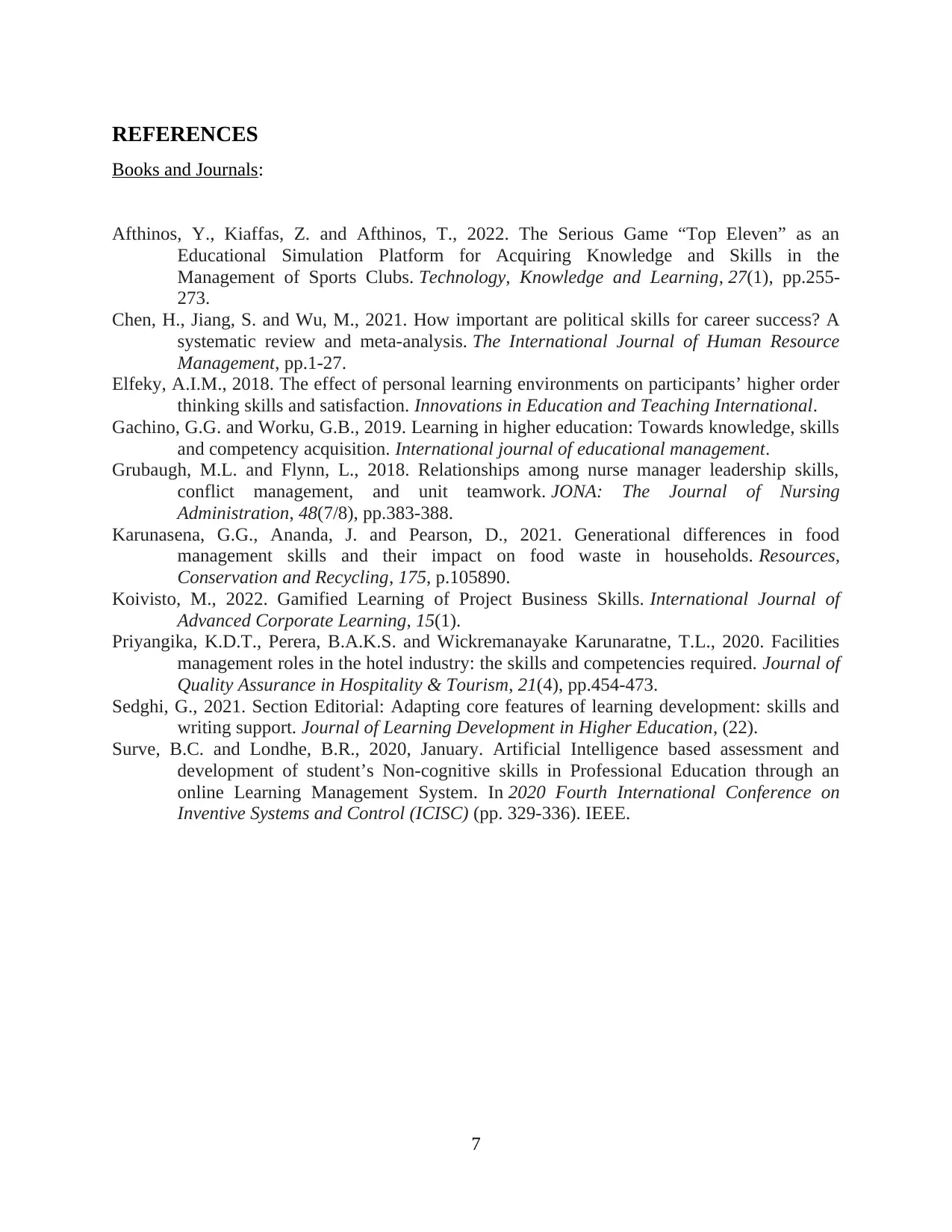
REFERENCES
Books and Journals:
Afthinos, Y., Kiaffas, Z. and Afthinos, T., 2022. The Serious Game “Top Eleven” as an
Educational Simulation Platform for Acquiring Knowledge and Skills in the
Management of Sports Clubs. Technology, Knowledge and Learning, 27(1), pp.255-
273.
Chen, H., Jiang, S. and Wu, M., 2021. How important are political skills for career success? A
systematic review and meta-analysis. The International Journal of Human Resource
Management, pp.1-27.
Elfeky, A.I.M., 2018. The effect of personal learning environments on participants’ higher order
thinking skills and satisfaction. Innovations in Education and Teaching International.
Gachino, G.G. and Worku, G.B., 2019. Learning in higher education: Towards knowledge, skills
and competency acquisition. International journal of educational management.
Grubaugh, M.L. and Flynn, L., 2018. Relationships among nurse manager leadership skills,
conflict management, and unit teamwork. JONA: The Journal of Nursing
Administration, 48(7/8), pp.383-388.
Karunasena, G.G., Ananda, J. and Pearson, D., 2021. Generational differences in food
management skills and their impact on food waste in households. Resources,
Conservation and Recycling, 175, p.105890.
Koivisto, M., 2022. Gamified Learning of Project Business Skills. International Journal of
Advanced Corporate Learning, 15(1).
Priyangika, K.D.T., Perera, B.A.K.S. and Wickremanayake Karunaratne, T.L., 2020. Facilities
management roles in the hotel industry: the skills and competencies required. Journal of
Quality Assurance in Hospitality & Tourism, 21(4), pp.454-473.
Sedghi, G., 2021. Section Editorial: Adapting core features of learning development: skills and
writing support. Journal of Learning Development in Higher Education, (22).
Surve, B.C. and Londhe, B.R., 2020, January. Artificial Intelligence based assessment and
development of student’s Non-cognitive skills in Professional Education through an
online Learning Management System. In 2020 Fourth International Conference on
Inventive Systems and Control (ICISC) (pp. 329-336). IEEE.
7
Books and Journals:
Afthinos, Y., Kiaffas, Z. and Afthinos, T., 2022. The Serious Game “Top Eleven” as an
Educational Simulation Platform for Acquiring Knowledge and Skills in the
Management of Sports Clubs. Technology, Knowledge and Learning, 27(1), pp.255-
273.
Chen, H., Jiang, S. and Wu, M., 2021. How important are political skills for career success? A
systematic review and meta-analysis. The International Journal of Human Resource
Management, pp.1-27.
Elfeky, A.I.M., 2018. The effect of personal learning environments on participants’ higher order
thinking skills and satisfaction. Innovations in Education and Teaching International.
Gachino, G.G. and Worku, G.B., 2019. Learning in higher education: Towards knowledge, skills
and competency acquisition. International journal of educational management.
Grubaugh, M.L. and Flynn, L., 2018. Relationships among nurse manager leadership skills,
conflict management, and unit teamwork. JONA: The Journal of Nursing
Administration, 48(7/8), pp.383-388.
Karunasena, G.G., Ananda, J. and Pearson, D., 2021. Generational differences in food
management skills and their impact on food waste in households. Resources,
Conservation and Recycling, 175, p.105890.
Koivisto, M., 2022. Gamified Learning of Project Business Skills. International Journal of
Advanced Corporate Learning, 15(1).
Priyangika, K.D.T., Perera, B.A.K.S. and Wickremanayake Karunaratne, T.L., 2020. Facilities
management roles in the hotel industry: the skills and competencies required. Journal of
Quality Assurance in Hospitality & Tourism, 21(4), pp.454-473.
Sedghi, G., 2021. Section Editorial: Adapting core features of learning development: skills and
writing support. Journal of Learning Development in Higher Education, (22).
Surve, B.C. and Londhe, B.R., 2020, January. Artificial Intelligence based assessment and
development of student’s Non-cognitive skills in Professional Education through an
online Learning Management System. In 2020 Fourth International Conference on
Inventive Systems and Control (ICISC) (pp. 329-336). IEEE.
7
⊘ This is a preview!⊘
Do you want full access?
Subscribe today to unlock all pages.

Trusted by 1+ million students worldwide
1 out of 9
Related Documents
Your All-in-One AI-Powered Toolkit for Academic Success.
+13062052269
info@desklib.com
Available 24*7 on WhatsApp / Email
![[object Object]](/_next/static/media/star-bottom.7253800d.svg)
Unlock your academic potential
Copyright © 2020–2025 A2Z Services. All Rights Reserved. Developed and managed by ZUCOL.



